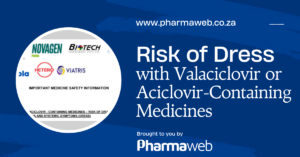Several pharmaceutical companies have come forward to address a critical safety concern related to the use of valaciclovir/aciclovir-containing medicines in a collaborative effort with the South African Health Products Regulatory Authority (SAHPRA).
The risk of Drug Reaction with Eosinophilia and Systemic Symptoms (DRESS) associated with these medications has prompted a comprehensive update to ensure healthcare professionals and patients are well-informed about this potential adverse reaction.
What is DRESS?
DRESS is a rare but serious and potentially life-threatening drug reaction characterized by fever, severe skin rash or peeling, swollen face, elevated white blood cell count (including eosinophils), and potential organ involvement, commonly affecting the liver.
This reaction has been reported in association with using valaciclovir/aciclovir-containing medicines, emphasizing the importance of vigilance and proactive monitoring when prescribing or taking these medications.
The symptoms of DRESS typically manifest within 2 weeks to 2 months after initiating valaciclovir/aciclovir-containing medicines, highlighting the delayed nature of this hypersensitivity reaction.
Healthcare professionals play a crucial role in educating patients about the signs and symptoms of DRESS and closely monitoring for any skin reactions that may indicate the onset of this serious condition.
What Should You Do as A Health Professional?
To address this safety concern effectively, healthcare professionals are advised to take the following actions:
1.Patient Education:
Patients should be informed about the signs and symptoms of DRESS at the time of prescription to facilitate early recognition and intervention if necessary.
2. Monitoring:
Patients should be closely monitored for any skin reactions or symptoms suggestive of DRESS during the course of treatment with valaciclovir/aciclovir-containing medicines.
3. Immediate Withdrawal:
If signs and symptoms of DRESS appear, prompt withdrawal of the medication is recommended, and alternative treatment options should be considered in consultation with a specialist.
4. Non-Restart Policy:
If a patient has developed DRESS while using valaciclovir/aciclovir-containing medicines, these medications should not be reintroduced at any point in the future.
Furthermore, healthcare professionals are encouraged to report any adverse drug reactions (ADRs) or product quality issues associated with these medications to the respective companies or SAHPRA.
For efficient data collection and analysis, reporting can be done through the SAHPRA website or via the provided ADR reporting form and email address.
The updated professional information (PI) and Patient Information Leaflet (PIL) of valaciclovir/aciclovir-containing medicines will reflect this critical safety information to ensure widespread awareness and adherence to the recommended guidelines.
In conclusion, pharmaceutical companies’ proactive approach, in collaboration with regulatory authorities, underscores their commitment to patient safety and the importance of continuous monitoring and reporting of adverse drug reactions. By staying informed and vigilant, healthcare professionals can contribute to the early detection and management of DRESS associated with valaciclovir/aciclovir-containing medicines, ultimately enhancing patient care and outcomes.

Add your first comment to this post